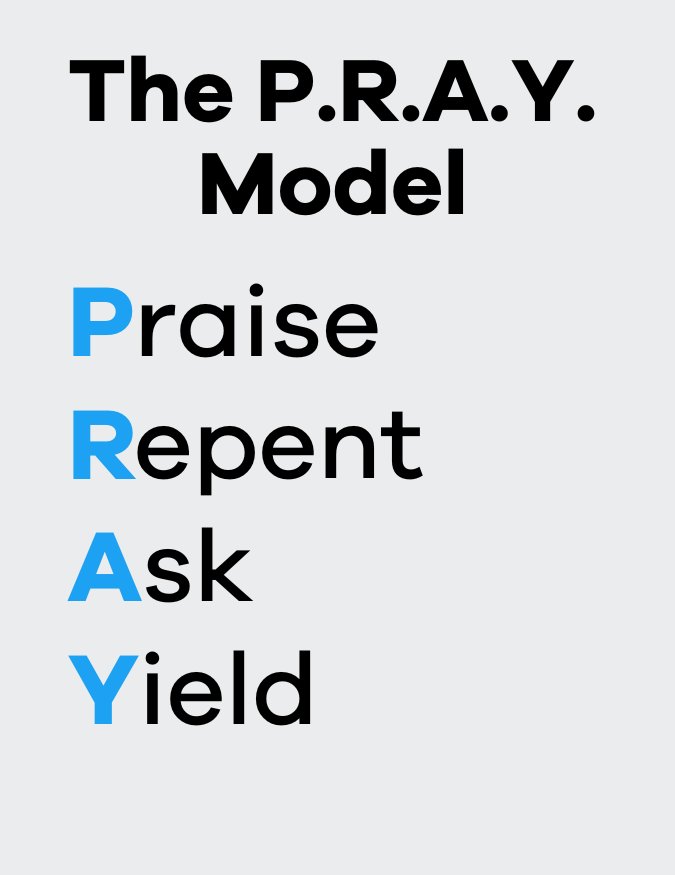Summary: The P.R.A.Y. prayer framework stands for Praise, Repent, Ask, and Yield. It’s a way to help you focus and organize your prayers if you’re unsure where to start.
We don’t have to follow a specific formula to talk with God, but using different prayer models and frameworks can help us get started and foster a deeper connection through prayer. So, if you’re wondering, ”How should I pray?” the P.R.A.Y. acronym lays it out for you.
The acronym stands for Praise, Repent, Ask, and Yield. These four types of prayer are beneficial to move through as you’re talking to God.
Again, you don’t need a specific prayer formula, but discipline leads to freedom. This model can help you as you intentionally spend time with God and grow in a personal relationship with him.

Praise
God is worthy to be praised. Prayer should begin with genuine praise towards God. Prayers of praise involve thanking God for who He is and what He’s done. As you spend time praising God, reflect on His character and the good gifts that He has given you.
Who God is
When it comes to praising God for who He is in prayer, one of the best ways to start is by focusing on His attributes. God is loving, merciful, just, wise, holy, and so much more. Take time to reflect on these attributes and thank God for each one of them. You can also praise God for His sovereignty over all things, His faithfulness, and His unchanging nature.
What God has done
Remember that genuine praise involves acknowledging God’s goodness and expressing gratitude for His blessings in your life. So, as you pray, make sure to thank God for all the ways He has shown His love and grace to you. Thank him for big things and small things. Don’t forget to praise God for His ultimate gift of salvation through Jesus Christ. As you do so, you will find that your heart is lifted up in worship and your relationship with God grows deeper and stronger.
Repent
Repentance is the act of turning away from sin and turning toward God. Since we as humans have a sinful, fallen nature, we should have a continuous attitude of repentance.
During this portion of your prayer time, confess specific sins that you can think of to God and repent of them. He already knows about all this stuff but still calls you to confess.
“If we confess our sins, he is faithful and just to forgive us our sins and to cleanse us from all unrighteousness.”
1 John 1:9
Agree with him about what He says about sin and righteousness. Ask Him to help you hate sin as He does, and to help you walk in holiness through the power of the Holy Spirit.
Ask
Spend the next portion of your prayer time asking God to work. God wants us to humbly ask Him for what we need and want. Asking Him means admitting we can’t do these things on our own.
Ask God to do things for others
When we ask God for things in prayer, we shouldn’t only ask Him to do things for us. We should intercede on behalf of others and ask God to work in their lives as well.
First of all, then, I urge that supplications, prayers, intercessions, and thanksgivings be made for all people, for kings and all who are in high positions, that we may lead a peaceful and quiet life, godly and dignified in every way. This is good, and it is pleasing in the sight of God our Savior, who desires all people to be saved and to come to the knowledge of the truth.
1 Timothy 2:1-4
Some groups of people you may want to pray for are:
- Your family.
- Your friends.
- Missionaries.
- Government leaders.
Ask God to do things for you
You can ask God for small things, big things, and things that only He can do. You may not always get the answer that you want, but you can be sure that whatever God does is ultimately what is best.
“Ask, and it will be given to you; seek, and you will find; knock, and it will be opened to you. For everyone who asks receives, and the one who seeks finds, and to the one who knocks it will be opened. Or which one of you, if his son asks him for bread, will give him a stone? Or if he asks for a fish, will give him a serpent? If you then, who are evil, know how to give good gifts to your children, how much more will your Father who is in heaven give good things to those who ask him!”
Matthew 7:7-11
Ask persistently
If you feel like you’re continually asking God for the same things, that’s ok! It’s a good thing to be persistent in prayer. Jesus told a parable to illustrate this exact point.
Then Jesus told his disciples a parable to show them that they should always pray and not give up. He said: “In a certain town there was a judge who neither feared God nor cared what people thought. And there was a widow in that town who kept coming to him with the plea, ‘Grant me justice against my adversary.’
For some time he refused. But finally he said to himself, ‘Even though I don’t fear God or care what people think, yet because this widow keeps bothering me, I will see that she gets justice, so that she won’t eventually come and attack me!’”
And the Lord said, “Listen to what the unjust judge says. And will not God bring about justice for his chosen ones, who cry out to him day and night? Will he keep putting them off?”
Luke 18:1-7
Yield
The final portion of your prayer time when you’re following the P.R.A.Y. model will be spent sitting quietly before God and listening to what He tells you. As you listen to what He tells you, commit to being obedient to whatever next step he may call you to take.
Those who have committed to following Jesus through repenting of their sin and placing their trust in Jesus have been given the Holy Spirit. The Spirit helps us in our weaknesses. He gives us both the desire and the power to yield to Jesus’ calling even when it is uncomfortable.
The P.R.A.Y. Model
This prayer framework isn’t a concrete instruction guide for how you have to pray. It’s a helpful model that can provide some structure for your prayer time or help you get started if you’ve never spent much time in prayer before.
The ACTS Prayer Model
You may have heard of using the ACTS prayer model to guide your prayers. The ACTS acronym is very similar to the P.R.A.Y. framework.
ACTS stands for Adoration, Confession, Thanksgiving, and Supplication. Adoration is when you praise God for who He is; Confession is when you confess your sins and ask for forgiveness; Thanksgiving is when you thank God for what He has done in your life; and Supplication is when you make your requests known to God.
We want to pray for you! Let us know how we can do that today.


